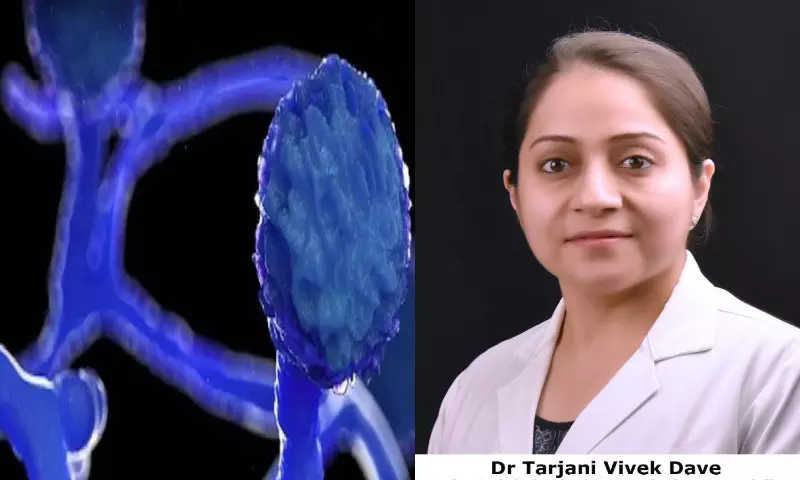Why this sudden spike in 'black fungus' cases in COVID second wave?
Telangana is on alert following a high number of Mucormycosis or black fungus cases. The state has pressed the panic button to produce medicines meant to treat black fungus.
By Dr Tarjani Vivek Dave
Hyderabad: Telangana is on alert following a high number of 'Mucormycosis' or black fungus cases. The state has pressed the panic button to procure medicines meant to treat black fungus.
The LV Prasad Eye Institute is witnessing at least 5-6 new cases of black fungus on a daily basis which is adding to the existing load, according to Dr. Tarjani Vivek Dave, senior ophthalmologist and oculoplasty specialist at the institute. The second wave of COVID-19 that India is witnessing is far more severe with an increase in the incidence of an unusual fungal infection. Popularly known as black fungus, it is caused by a ubiquitous fungus found all around us in soil, water, and air called Mucor, she said.
Why this sudden spike in Mucormycosis in COVID-19?
Black fungus or Mucormycosis can occur either concurrent to the COVID-19 infection or in the early post-recovery phase and affect the sinuses, eyes, and brain. Even though Mucor is present in the oral and respiratory lining of healthy individuals, it does not manifest as an infection in the presence of a healthy and intact immune system. Generally, this infection occurs in patients with uncontrolled diabetes, those undergoing cancer chemotherapy or on long-term steroid therapy, patients following organ transplantation and extensive burns and poly-trauma (severe injuries).
The COVID-19 virus causes a reduction in the lymphocyte (white blood cell) levels in the body. WBCs are the body's first line of defense against infections. Its failure allows for Mucor to attack the body and spread in the tissues. The current COVID management protocols require judicious but high dose steroid usage in those patients whose lungs have got affected. While helping to bring the COVID-related damage under control, the counter-effect of such high dose steroids is suppression of the body's immune mechanisms, which in turn makes our body more vulnerable to the adverse effects of this black fungus.
Certain drugs called immunomodulators used to treat severe cases of COVID-19 can cause immunosuppression. ICU admissions with long-term oxygen inhalation may result in a drop in oxygen mask hygiene. If the patient has pre-existing, poorly controlled diabetes, he/she is more at risk of developing Mucormycosis.
As the severity of the second wave is far more intense, more patients are being put on steroids and oxygen, and hence the increase in the cases of black fungus.
What are the common symptoms? -
Any kind of facial pain, including pain over the sinuses (cheekbones), stuffy nose, blood-stained or black nasal discharge, drooping of the upper eyelid, and unusual bulging of the eyes are symptoms of black fungus. Other symptoms include restricted movement of the eyeball, sudden redness and extreme swelling over the eyeball, sudden decrease in vision, and black lesions on the palate or dental pain.
If the patient experiences any such symptoms, s/he should immediately consult a specialized eye surgeon, preferably an oculoplasty specialist. Alternatively, an ENT surgeon can also be consulted. Patients can also avail teleconsultation if they are in isolation or under hospital admission.
What is the available treatment?
Mucormycosis is a very invasive infection with significant morbidity and mortality. Blood tests to check sugar levels, nasal swabs, and MRI scan are generally done to find out the presence and extent of the Mucor infection.
Early and localized infections can be treated with intravenous and local anti-fungal injections followed by a long course of oral anti-fungal medications. Extensively spread infections require aggressive sinus surgery to clear the internal contents of the cheekbones and injections behind the eye.
In a lot of these cases, unfortunately, the entire eyeball may need to be removed in order to contain the infection and avoid fatality. In order to take precautions to reduce the risk of contracting Mucormycosis, patients can consult their treating physician to ensure good control of blood sugar both during and after recovery from COVID-19.
Before your physician puts you on a particular treatment plan, diligently list out to them the physical ailments that you have, especially diabetes and high blood pressure. Steroids should be used very judiciously during active COVID-19 infection, i.e. only when the saturation on room air falls below 94, and that too under the care of an expert who can monitor blood sugar rise and treat it promptly. Those under home isolation may not need any steroid treatment. Hygiene of oxygen masks and humidifiers should be maintained with utmost care.
Eat healthy, stay stress-free, and follow COVID precaution protocols. These small tips would hopefully help keep this fungus at bay.